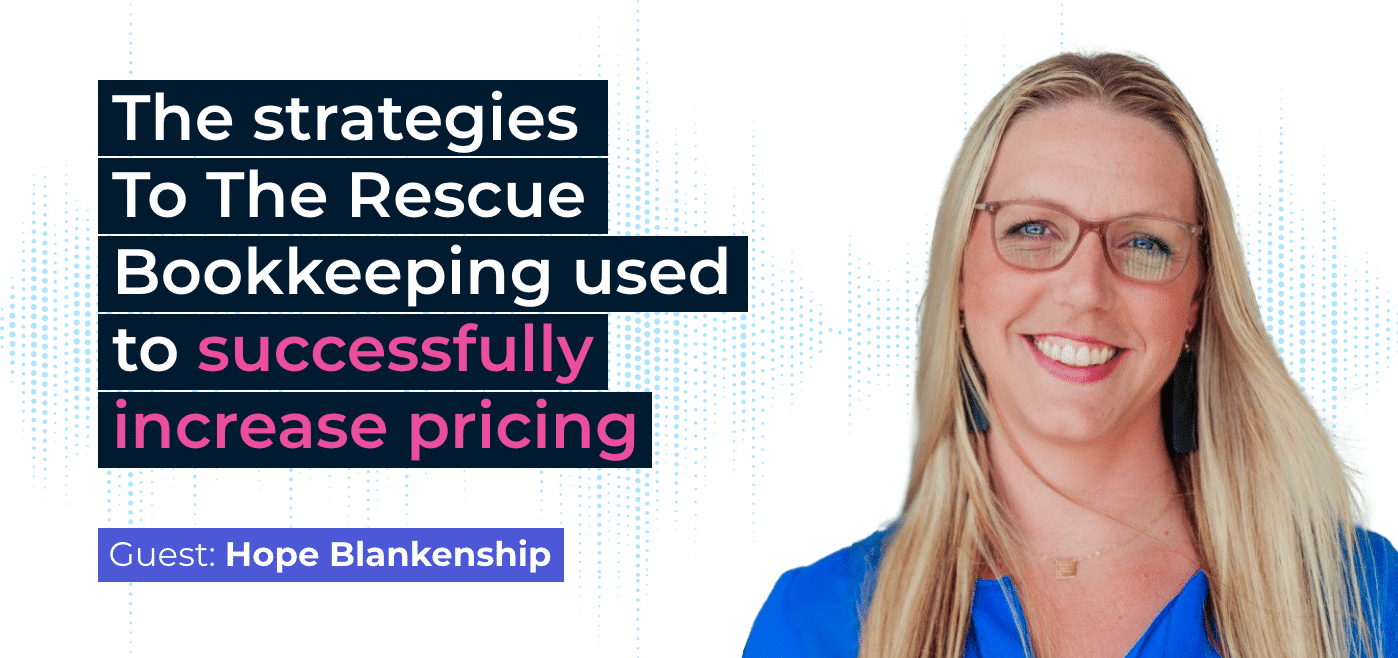S01 E02: The strategies To The Rescue Bookkeeping used to successfully increase pricing
Guest: Casey Haynes

Podcasts » S01 E02: The strategies To The Rescue Bookkeeping used to successfully increase pricing
Meet Hope Blankenship, the owner of To The Rescue Bookkeeping. They are an accounting firm with seven team members and over 200 clients.
In this episode, we talk about the experience she had growing her team and the effective strategies she used to successfully increase pricing with her clients.
Show Notes
Host:
Welcome back to another episode of The Accounting Firm podcast where we bring you valuable discussions and insights from accounting firm owners. In today’s episode, we have a special guest joining us to discuss the strategies outlined in their book, “To the Rescue: The Ultimate Guide to Effective Bookkeeping.” Our guest today is Hope Blankenship, a renowned expert in bookkeeping and the author of this insightful guide. Hope, welcome to the show!
Guest:
Thank you, Shahram. I’m thrilled to be here and share some valuable bookkeeping strategies with your audience.
Host:
Let’s dive right into the topic. Your book provides strategies for effective bookkeeping. Can you give us an overview of the key concepts covered in your guide?
Guest:
Absolutely. “To the Rescue: The Ultimate Guide to Effective Bookkeeping” focuses on helping businesses streamline their financial management processes. It covers a range of topics, including setting up a chart of accounts, managing cash flow, reconciling accounts, tracking expenses, and preparing financial statements. The guide also emphasizes the importance of maintaining accurate records and implementing efficient bookkeeping systems.
Host:
Those are essential areas for any business to master. Could you share some specific strategies from your book that can help businesses improve their bookkeeping practices?
Guest:
Of course. One of the core strategies I discuss in the book is the importance of setting up a well-organized chart of accounts. This provides a clear structure for categorizing income and expenses, making it easier to track and analyze financial data. I provide practical tips on creating a customized chart of accounts that aligns with the unique needs of each business.
Another strategy I emphasize is regular bank reconciliation. This involves comparing a company’s financial records with the bank statement to ensure accuracy and identify any discrepancies. I provide step-by-step instructions on performing bank reconciliations and offer insights into common challenges and how to overcome them.
I also delve into the significance of tracking expenses diligently. By implementing effective expense tracking methods, businesses can better monitor their spending, identify cost-saving opportunities, and make informed financial decisions. I offer practical suggestions and tools for simplifying expense tracking processes.
Host:
Those strategies are invaluable for businesses striving for financial efficiency. In your experience, what are some of the common mistakes or challenges businesses face when it comes to bookkeeping, and how can they address them?
Guest:
One common mistake I often see is businesses neglecting to separate personal and business finances. Mixing personal and business expenses can lead to confusion, inaccurate records, and compliance issues. I stress the importance of establishing separate bank accounts and using dedicated accounting software to keep personal and business finances distinct.
Another challenge is procrastination when it comes to bookkeeping tasks. Many business owners find bookkeeping tedious and time-consuming, leading to procrastination and a pile-up of paperwork. I encourage businesses to set aside dedicated time for bookkeeping regularly, whether it’s weekly, biweekly, or monthly. Additionally, utilizing automation and digital tools can help streamline processes and save time.
Host:
Great advice. Your book seems to offer a comprehensive approach to effective bookkeeping. Are there any additional strategies or insights you’d like to share with our listeners?
Guest:
Absolutely. In the book, I emphasize the importance of ongoing education and staying up-to-date with bookkeeping best practices. The financial landscape is constantly evolving, and it’s crucial for businesses to adapt. I encourage readers to invest in their knowledge by attending workshops, seminars, or online courses, and to seek guidance from professional bookkeepers or accountants when needed.
Furthermore, I emphasize the value of leveraging technology to enhance bookkeeping processes. There are numerous accounting software solutions available that can simplify and automate tasks, such as invoicing, expense tracking, and financial reporting. Adopting these tools can significantly improve efficiency and accuracy.
Host:
Thank you for joining us today.




